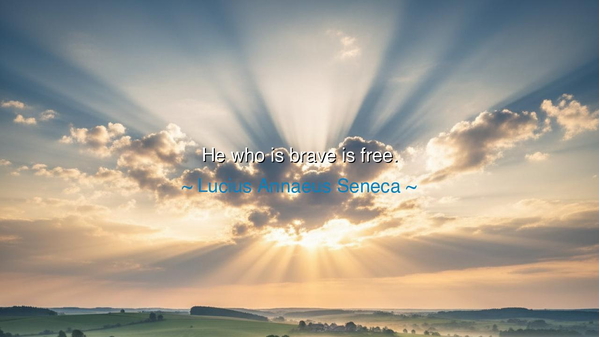
He who is brave is free.






In the timeless words of Lucius Annaeus Seneca, philosopher of Rome and master of the Stoic path, we find a truth carved not in stone, but in the very marrow of the human spirit: “He who is brave is free.” These words, though brief, contain an ocean of wisdom. They speak not of conquest or of empire, but of the greatest victory a man can achieve — victory over fear. For Seneca knew, as few ever have, that fear is the first and final chain that binds the soul. The man who has conquered fear, who walks into uncertainty with courage in his heart, becomes untouchable — for he has mastered himself, and therefore, he is free.
Seneca, born in Córdoba and raised amid the splendor and treachery of Rome, lived in an age when emperors ruled by terror, and lives hung by the whisper of suspicion. As a statesman under Emperor Nero, he witnessed the cruelty of power and the fragility of peace. Yet through his writings — letters to his friend Lucilius, and essays on virtue, mortality, and reason — he built a philosophy that could not be destroyed by tyrants. His Stoicism taught that the only true freedom is the freedom of the mind, and that this freedom belongs not to the rich or the powerful, but to the brave. No prison, no threat, no ruler can enslave the man who fears nothing, because such a man obeys not the world, but his own soul.
To Seneca, courage was not reckless defiance, but a sacred stillness — the strength to face pain, loss, or death without surrendering one’s peace. “He who is brave,” he wrote, “is free,” because courage severs the cords of dependency — dependency on comfort, approval, and safety. The coward lives always under the shadow of “what if”; the brave man lives in the light of “I will.” He is not ruled by circumstance, for he has accepted all things that fate may bring. Thus, the chains that hold others — fear of failure, fear of judgment, fear of death — fall away. The brave do not flee from life, nor cling to it; they stand upright in the storm, serene in the knowledge that while they cannot control the world, they can control themselves.
History is filled with those who proved the truth of Seneca’s words. Consider Socrates, who, though condemned unjustly by his own city, refused to escape from prison when given the chance. He chose to drink the cup of hemlock, facing death calmly, teaching his students to the very end. He could have fled — but in doing so, he would have betrayed his principles. By meeting death without fear, Socrates showed the world that freedom lies not in survival, but in integrity. His body was imprisoned, but his spirit was infinite. He was brave, and therefore, he was free.
Or think of Harriet Tubman, who led enslaved souls through the darkness of the Underground Railroad, again and again risking capture and death. She feared, yes — for fear is the companion of courage — but she did not bow to it. In her bravery, she shattered not only the physical chains of others but the spiritual chains of her own bondage. Her freedom was not granted by law; it was claimed by courage. Like Seneca’s ideal, she understood that freedom is not given — it is lived, one act of bravery at a time.
Seneca’s wisdom also pierces into the heart of the modern age. Today, we live surrounded by comforts, yet enslaved by anxieties — afraid of rejection, of loss, of imperfection. We build walls of safety and call them peace, yet within those walls our spirits grow small. But freedom, as Seneca teaches, cannot be purchased or protected; it must be earned through courage. To speak truth when silence is easier, to act when doubt says “wait,” to love even when it risks pain — these are the acts of the free. Every time you choose courage over fear, you loosen the chains that bind you.
The lesson, then, is both eternal and urgent: if you would be free, be brave. Do not fear hardship, for hardship is the furnace of the soul. Do not seek to avoid suffering, for suffering is the teacher of endurance. Look within, and see that your greatest enemy is not the world, but the trembling of your own heart. As Seneca taught, freedom is not found in the absence of fear, but in the conquest of it. The man who stands unshaken amid chaos, who endures insult without bitterness, who accepts fate with calm — that man walks as a king even in rags, for he is the master of himself.
So, dear listener, remember this sacred truth: He who is brave is free. The coward may live in comfort, but he is never at peace; the brave may suffer, but his spirit soars. Walk the path of courage — not the loud courage of pride, but the quiet courage of steadfastness. Face what frightens you. Speak what truth burns within you. Meet life as it comes, neither craving nor fleeing. Then, even in chains, you will know what emperors and kings have long forgotten — that freedom is not a gift of the world, but the birthright of the courageous soul.






AAdministratorAdministrator
Welcome, honored guests. Please leave a comment, we will respond soon